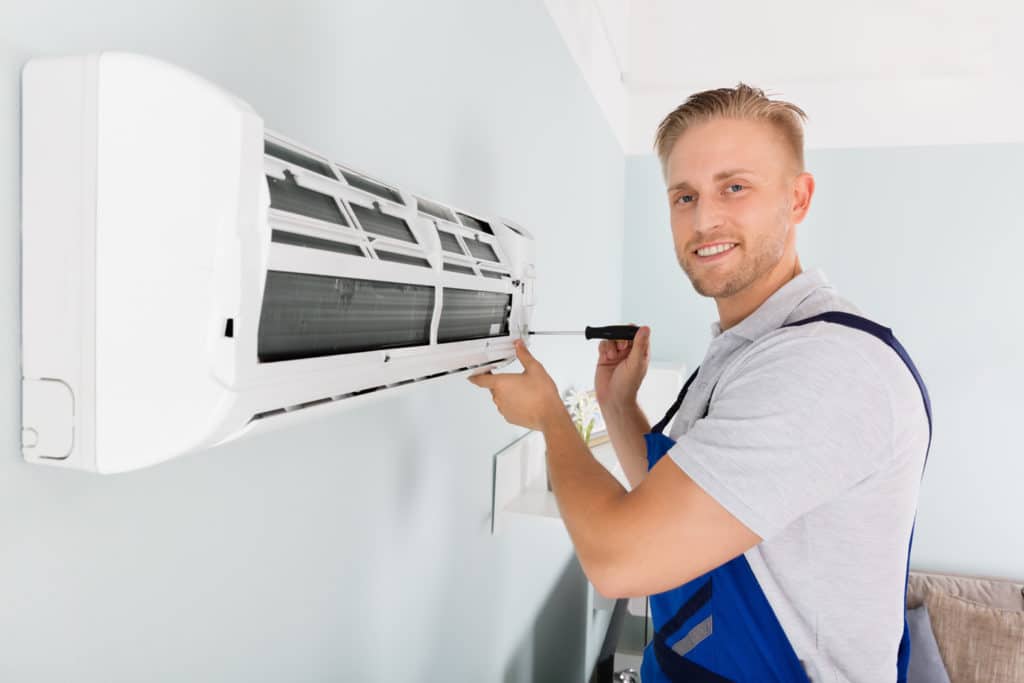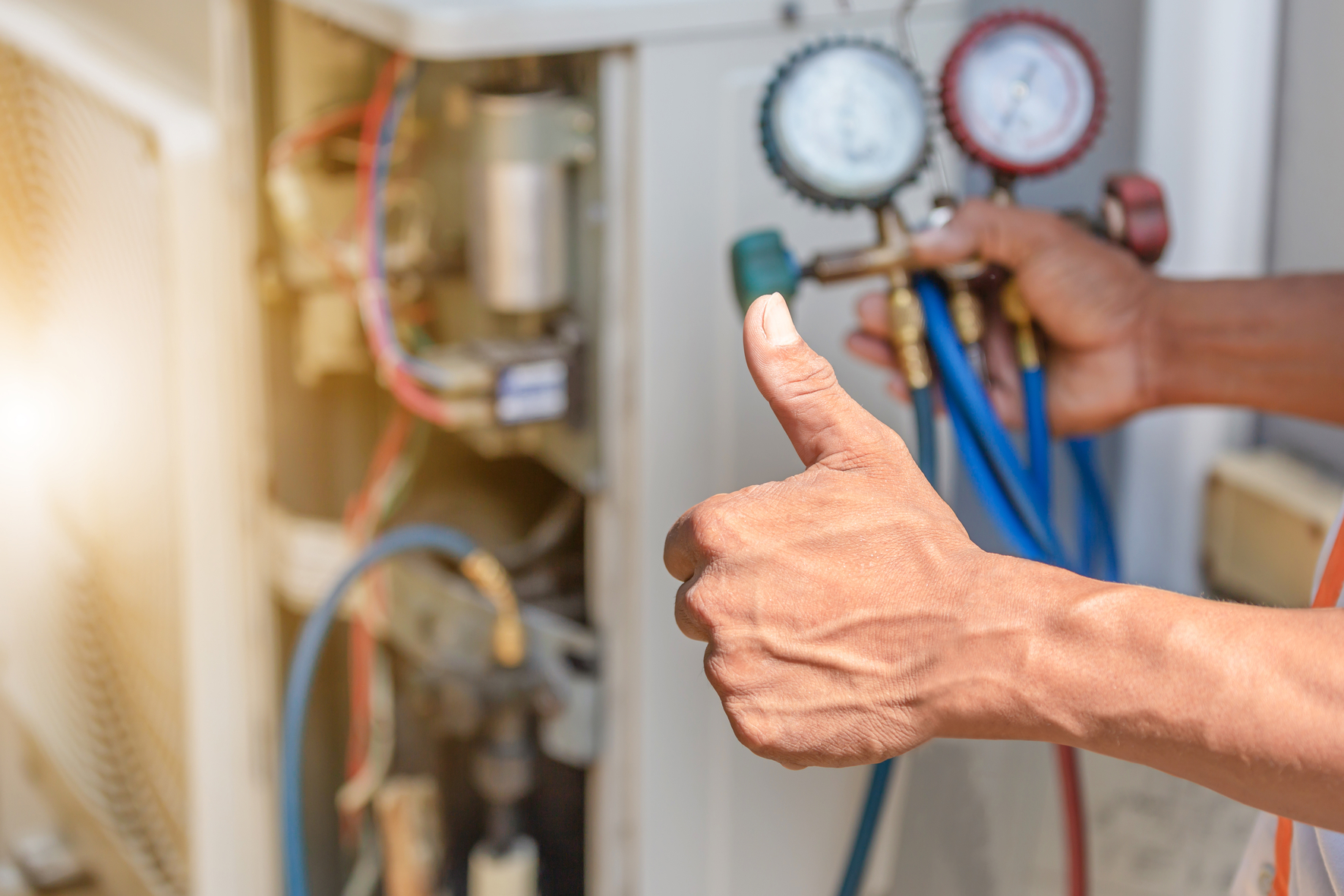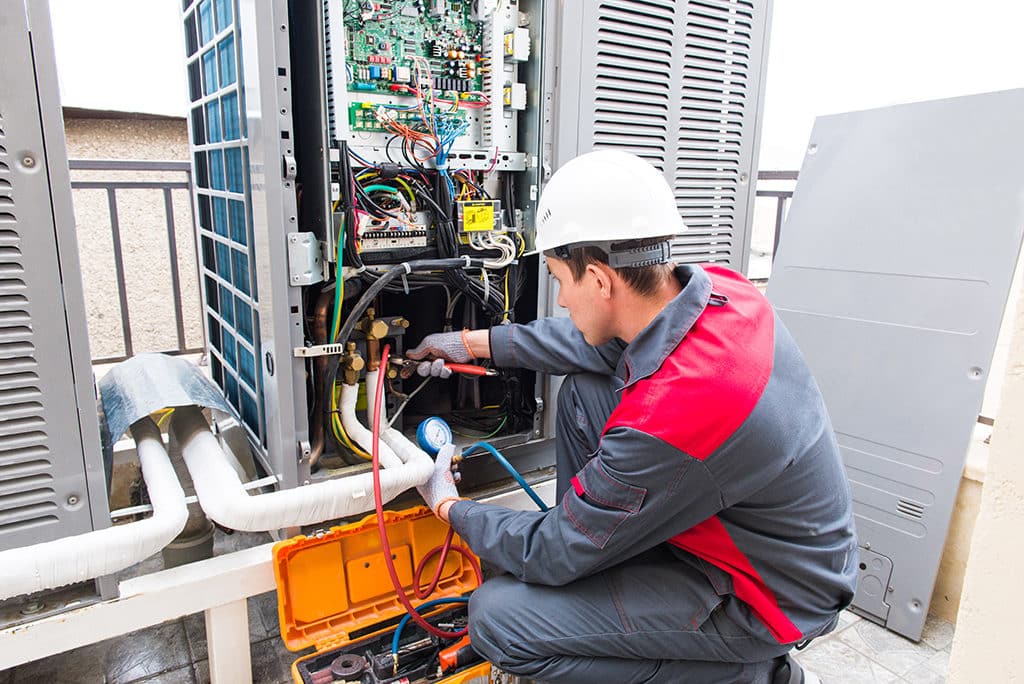Imagine your a/c as a master sculptor, adeptly chiseling away at the overbearing heat in your house, leaving a cool, comfy sanctuary. Have you ever questioned how this contemporary marvel accomplishes such an accomplishment?
The detailed dancing of refrigerants, coils, compressors, and air ducts all operate in consistency to produce that invigorating blast of cold air. However how specifically do these components collaborated to produce that much-needed respite from the sweltering warm?
Let's reveal the inner operations of ac system and debunk the scientific research behind remaining cool.
Secret Takeaways
- Effective Air conditionings utilize cooling agents to absorb and launch warmth, improving cooling and energy performance.
- Routine upkeep makes certain optimal performance, longevity, and power financial savings.
- Correct sizing and layout avoid energy waste and make certain even cooling circulation.
- Comprehending air movement dynamics and optimization enhances cooling efficiency and comfort degrees.
The Fundamentals of Air Conditioning
Understanding the fundamentals of air conditioning can considerably enhance your knowledge of just how these systems run efficiently. Power efficiency is an essential aspect of a/c, as it not only influences your electrical power expense however also the atmosphere. Effective a/c unit make use of much less energy to cool down a space, making them economical and environment-friendly. By investing in an energy-efficient unit, you can take pleasure in a comfy interior setting while minimizing your carbon impact.
Humidity control is another vital feature of cooling. Air conditioning unit assist manage the moisture degrees in your home, developing a much more comfortable atmosphere. Excess moisture can lead to mold and mildew development and pain, while reduced humidity degrees can create dry skin and respiratory problems. A well-maintained ac unit can effectively manage humidity, guaranteeing a healthy and enjoyable living setting for you and your household.
Understanding exactly how air conditioning systems handle power effectiveness and humidity control can aid you make informed choices when selecting and using these systems in your home.
Recognizing Refrigerants and Their Function
When it pertains to air conditioners, comprehending cooling agents and their function is important. You'll learn more about the value of cooling agents in cooling down systems and just how they assist in the heat transfer process.
In addition, thinking about the ecological effect of refrigerants is necessary for lasting cooling remedies.
Duty of Refrigerants
Cooling agents play a vital function in the operation of a/c unit by facilitating the transfer of heat. The effectiveness of a cooling agent straight affects the cooling process and power usage of the system.
When considering refrigerants, it's important to weigh their efficiency versus their environmental effects. Some cooling agents contribute to ozone depletion and worldwide warming, motivating the search for greener alternatives. Lasting steps concentrate on finding refrigerant options that are energy-efficient and have very little ecological effect.
Suppliers are increasingly investing in creating new refrigerants that line up with sustainability goals. By prioritizing refrigerant effectiveness and exploring sustainable choices, the air conditioning industry aims to reduce its carbon impact and decrease ecological injury.
Ecological Influence Factors To Consider

Taking into consideration the ecological impact of cooling agents is essential in assessing the sustainability of a/c systems. When examining the environmental ramifications of a/c, 2 vital elements to think about are power performance requirements and carbon impact analysis.
- Energy Efficiency Criteria:
- Energy-efficient air conditioning unit consume much less electrical energy, decreasing total power consumption and environmental effect.
- Carbon Footprint Evaluation:
- Performing a carbon impact evaluation assists in recognizing the amount of greenhouse gas exhausts associated with cooling procedures.
- Refrigerant Selection:
- Going with refrigerants with reduced International Warming Potential (GWP) can significantly lower the environmental effect.
- Appropriate Disposal:
- Ensuring correct disposal of old refrigerants avoids them from damaging the atmosphere.
- Normal Upkeep:
- Regular maintenance of cooling systems can improve performance, decreasing energy consumption and ecological impact.
The Process of Warm Transfer
When your ac unit runs, it relies upon a procedure of warmth transfer to cool your space successfully. This device involves the absorption of warmth from the interior air and the exchange of thermal power to maintain a comfy temperature level.
Recognizing this crucial facet aids you understand exactly how ac unit properly control the environment in your house.

Heat Absorption Mechanism
To properly cool down the air in your space, ac system utilize a warm absorption system that efficiently transfers warmth. This device plays a crucial duty in keeping temperature guideline and utilizing advanced cooling technology.
Below's just how the warm absorption process works:

- Refrigerant Blood circulation: The refrigerant absorbs heat from the indoor air.
- Compression: The compressor raises the stress of the refrigerant, triggering its temperature level to rise.
- Condensation: The hot, pressurized cooling agent launches warm outside as it condenses into a fluid.
- Development Valve: This part decreases the refrigerant pressure, creating it to cool off and vaporize.
- Dissipation: As the refrigerant evaporates, it soaks up warmth from the interior air, starting the cycle once again.
Thermal Energy Exchange
In the process of thermal power exchange, warmth transfer plays a crucial function in just how ac system work to cool interior spaces successfully. Thermal characteristics dictate that warmth constantly flows from a warmer area to a cooler one. Air conditioning unit leverage this principle by removing warm from indoor air and launching it outside, utilizing cooling agents to help with the transfer.
Effective thermal energy exchange is necessary for the power effectiveness of a cooling system. By optimizing warm transfer processes, air conditioning system can cool down areas successfully while decreasing power intake. Comprehending the characteristics of warm transfer is vital for creating and operating air conditioning unit that supply the wanted degree of convenience without unnecessary power wastefulness.
Evaporator Coils and Their Feature
Understanding the feature of evaporator coils is key to grasping how a/c unit efficiently cool down interior areas. These coils play an important duty in the cooling procedure by soaking up warmth from the indoor air, which is then circulated back as cool air.
Here are some bottom lines regarding evaporator coils:
- Evaporator coil performance straight influences the cooling performance of the air conditioning unit.
- These coils have cooling agent that evaporates as it absorbs heat from the interior air.
- As the refrigerant evaporates, it changes from a liquid state to a gas, cooling down the air in the process.
- The cooled down air is after that distributed throughout the room using the duct.
- Appropriate maintenance of the evaporator coils, such as routine cleaning, is necessary to assure top performance and power effectiveness.
Compressor and Condenser Operations
Successfully cooling interior spaces includes understanding just how the compressor and condenser work together in an air conditioning system. The compressor plays a crucial role in the cooling procedure by pressurizing the refrigerant gas, boosting its temperature and energy degree. This high-energy gas after that streams to the condenser, where it launches warmth to the surrounding environment, causing it to condense into a high-pressure fluid.
The condenser further cools this fluid with warm exchange with the outside air, transforming it back into a low-pressure gas. This process boosts energy effectiveness and improves the system's cooling power. Temperature level policy is attained as the refrigerant cycles via these system components, absorbing warmth inside and releasing it outdoors.
Air Ducts and Air Circulation
To maximize airflow and assurance consistent air conditioning throughout your room, proper installation and upkeep of air ducts are crucial. Ensuring that your air ducts are developed effectively and in a way that advertises ideal air flow characteristics is vital for the general performance of your a/c system. Ventilation approaches play a substantial duty in preserving interior convenience degrees, so it's important to take note of the following:
- Duct Design: Correctly created air ducts aid ensure that awesome air gets to every corner of your area successfully.
- Airflow Dynamics: Comprehending how air steps with the air ducts can aid you recognize any possible concerns that may interfere with the cooling process.
- Normal Maintenance: Keeping your duct clean and free of obstructions is important for keeping air flow and system effectiveness.
- Securing Leakages: Making certain that there are no leakages in your ductwork assists avoid great air from getting away, enhancing power performance.
- Stabilizing Air movement: Appropriately stabilizing the airflow in various rooms can aid preserve regular cooling throughout your office or home.

Frequently Asked Concerns
Just how Does the Size of an A/c Affect Its Performance and Cooling Capacity?
When choosing an air conditioning unit, bear in mind that dimension matters. An unit that's also tiny may struggle to cool your room effectively, while a large one might lose energy and not evaporate correctly. Ensuring appropriate sizing considerations will certainly enhance performance and air conditioning capability.
The appropriate dimension straight influences performance, aiding you remain comfy without unneeded costs. So, when it comes to a/c, bear in mind size for best efficiency and cooling down power.
What Are Some Usual Upkeep Jobs That Can Aid Boost the Life Expectancy of an A/c Unit?
Regular maintenance jobs can significantly prolong the life of your air conditioning system. Remember to change filters to guarantee appropriate air movement and clean coils to enhance cooling down efficiency.
In addition, calibrate your thermostat for precise temperature analyses and check the cooling agent levels for best performance.
Can Air Conditioners Be Used in Conjunction With Other Cooling Approaches, Such as Fans or Dehumidifiers?
Yes, you can boost your cooling experience by integrating your air conditioning system with fans. This cooperation can assist flow awesome air more effectively, providing an extra comfortable environment and potentially saving power.
In addition, using a dehumidifier together with your ac unit can increase cooling efficiency by lowering humidity levels, making your room feel cooler.
Take into consideration these alternatives to maximize your air conditioning configuration and boost your total comfort throughout hot days.
Are There Any Type Of Ecological Worries Related To using Air Conditioners, and Just How Can They Be Mitigated?
When making use of air conditioning unit, be mindful of environmental worries like energy usage and greenhouse gas exhausts.
To mitigate these issues, consider sustainable air conditioning techniques and environment-friendly options.
You can reduce the impact of air conditioning unit by utilizing energy-efficient models, preserving them on a regular basis, and incorporating other cooling techniques like fans or dehumidifiers.
What Innovations Are Being Made in Air Conditioning Innovation to Make Devices A Lot More Energy-Efficient and Environmentally Friendly?
To make a/c unit extra energy-efficient and green, innovations like clever modern technology and eco-friendly features are being created. These technologies focus on raising power savings and reducing ecological impact.
By incorporating clever technology, cooling systems can enhance performance based on use patterns. Making use of environment-friendly products and parts additionally contributes to making these devices a lot more lasting.
These developments aim to enhance efficiency while reducing the environmental impact of cooling technology.
Conclusion
So, currently you know exactly how a/c function!
From the refrigerants distributing through the system to the heat transfer procedure, each part plays a necessary role in maintaining you cool.
The evaporator coils absorb heat, the compressor and condenser launch it, and the air ducts distribute the cool air throughout your room.
Following time you turn on your AC, remember the scientific research behind everything! Stay amazing!
https://kentishtownacinstallation.co.uk
